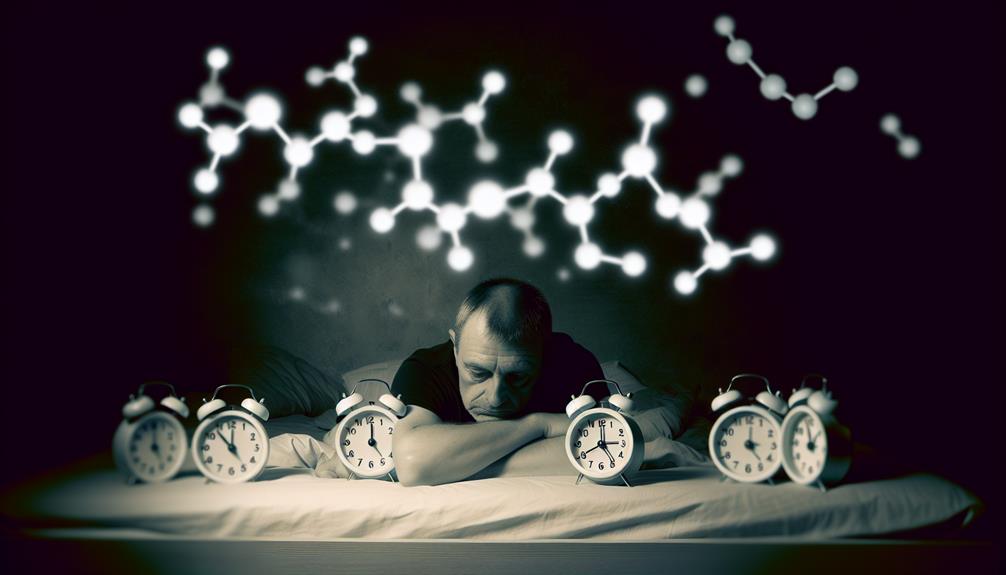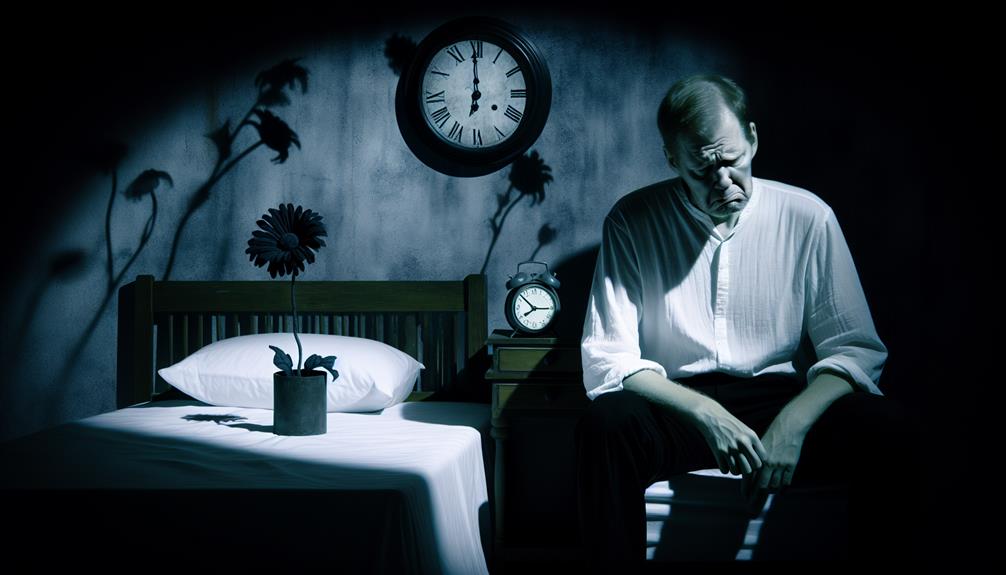Sleep deprivation has a profound impact on men's hormonal health. I've noticed that inadequate sleep considerably lowers testosterone levels—by up to 20% with just a few hours less. It also leads to elevated cortisol, which can increase anxiety and promote fat storage. Insulin sensitivity suffers too, raising the risk of metabolic issues like type 2 diabetes. On top of that, sleep deprivation negatively affects libido and sexual performance, threatening relationship dynamics. Overall, the consequences are serious and far-reaching. There's much more to explore about managing these effects effectively.
Overview of Sleep Deprivation
When we think about sleep deprivation, it's essential to recognize its growing prevalence in today's fast-paced world. Many of us find ourselves sacrificing sleep to meet various demands, often unaware of the profound effects this can have on our overall health. Sleep cycles play a significant role in maintaining our mental clarity and cognitive function. Ideally, these cycles allow our bodies to undergo necessary recovery processes, balancing our circadian rhythm, which governs our sleep-wake patterns.
When we don't get enough sleep, we disrupt these cycles, leading to significant mood fluctuations and diminished physical performance. I've noticed that a lack of sleep can make even simple tasks feel overwhelming, affecting my ability to concentrate and think clearly. This cognitive impairment is not just a temporary inconvenience; it can accumulate over time, resulting in chronic stress response mechanisms that further exacerbate the problem.
Moreover, sleep deprivation can impair our physical performance, making everyday activities seem more strenuous. I've experienced times when fatigue hindered my motivation to exercise or engage in physical tasks. As I explore deeper into the implications of sleep deprivation, it becomes clear that the impact on both our mental and physical states is substantial. Understanding this connection is the first step toward recognizing the importance of prioritizing sleep. By doing so, we can enhance our overall well-being and optimize our daily functioning.
Impact on Testosterone Levels
Sleep deprivation can markedly alter testosterone levels, an important hormone for men's health and well-being. As I explore the effects of insufficient sleep, it's important to recognize how it disrupts hormonal balance, particularly concerning testosterone fluctuations. Studies have shown that even short-term sleep deprivation can lead to significant drops in testosterone production. This is concerning, as testosterone is essential for various bodily functions, including muscle mass maintenance, mood regulation, and overall energy levels.
To illustrate the impact of sleep deprivation on testosterone levels, take a look at the table below:
| Sleep Duration | Testosterone Level Change | Notes |
|---|---|---|
| 8 hours | Baseline | Ideal level maintained |
| 5-6 hours | -10% to -15% | Noticeable decrease |
| <5 hours | -20% or more | Severe impact on health |
From this table, it's evident that as sleep duration decreases, testosterone levels also decline. These testosterone fluctuations not only affect physical performance but can also lead to emotional disturbances and a decreased quality of life.
Effects on Cortisol Production

Cortisol, often referred to as the stress hormone, tends to rise considerably during periods of sleep deprivation. I've come to understand that this increase isn't just a fleeting response; it impacts the body's cortisol rhythm, which is fundamental for maintaining various physiological functions. Under normal circumstances, cortisol levels follow a natural pattern, peaking in the early morning and gradually declining throughout the day. However, when sleep is compromised, this rhythm can be disrupted, leading to elevated cortisol levels at inappropriate times.
This elevation is part of our stress response, which is designed to help us cope with immediate challenges. Yet, when sleep deprivation becomes chronic, the body may remain in a heightened state of stress, which can have several negative consequences. For instance, persistently high cortisol levels can lead to increased anxiety, irritability, and even weight gain, as the body prioritizes fat storage in response to perceived threats.
Moreover, the imbalance in cortisol production can interfere with other hormones, aggravating issues like low testosterone levels, which we've already discussed. It's clear that maintaining a healthy cortisol rhythm is essential for optimal hormonal health. If you're experiencing sleep deprivation, it's important to prioritize restorative sleep, as doing so can help mitigate these adverse effects and promote a healthier balance in your hormonal system. Our bodies thrive on consistency, and establishing a regular sleep pattern is one of the best ways to support your hormonal health.
Influence on Insulin Sensitivity
In my exploration of sleep deprivation's impact, I've found that it greatly disrupts hormonal regulation, which can lead to increased insulin resistance. This disruption not only affects how our bodies process glucose but also has broader implications for metabolic health. Understanding this relationship is essential for recognizing the potential long-term consequences of insufficient sleep.
Hormonal Regulation Disruption
Hormonal regulation plays an essential role in maintaining insulin sensitivity, and disruptions in this balance can have significant implications for men's health. When I think about how sleep deprivation impacts hormonal balance, I can't overlook its influence on the body's stress response. A lack of sleep can elevate cortisol levels, which in turn disrupts endocrine function. This disruption affects not only metabolic regulation but also reproductive health, as hormones like testosterone can be negatively impacted.
Moreover, sleep deprivation can throw off the circadian rhythm, which is fundamental for maintaining overall wellness. With a disturbed circadian rhythm, I notice that mood stability often suffers, leading to increased irritability and anxiety. This interplay between sleep and hormonal health highlights the importance of a well-functioning endocrine system.
When I consider these factors, it becomes clear that ensuring adequate sleep is essential for maintaining insulin sensitivity and supporting the broader spectrum of hormonal health. By prioritizing sleep, we can mitigate the adverse effects on our metabolic processes and overall quality of life, ultimately promoting better health outcomes.
Increased Insulin Resistance
Sleep deprivation's impact on the endocrine system doesn't just stop at hormonal regulation; it also contributes greatly to increased insulin resistance. When I consider how lack of sleep affects my body, I can't ignore the role of insulin signaling. Sleep deprivation disrupts this vital process, leading to impaired glucose metabolism and heightened insulin resistance. Fundamentally, my body struggles to respond effectively to insulin, which is essential for regulating blood sugar levels.
This disruption can trigger a cascade of metabolic dysfunctions. Over time, my body may become less efficient at using glucose, increasing the risk of developing conditions like type 2 diabetes. Research shows that inadequate sleep can elevate cortisol levels, which further exacerbates insulin resistance. It's a vicious cycle—poor sleep leads to metabolic issues, which can then contribute to more sleep disturbances.
Consequences for Libido and Sexual Health

Often overlooked, the impact of sleep deprivation on libido and sexual health can be significant. As I've come to understand, the interplay between sleep and sexual performance can influence various aspects of a man's life. Lack of quality sleep can lead to noticeable libido fluctuations, which often create intimacy issues in relationships. I've noticed that when I'm sleep-deprived, my mood changes, leading to stress management challenges that further exacerbate relationship dynamics.
Consider these points:
- Fertility concerns: With disrupted sleep patterns, testosterone levels can decline, affecting sperm production and overall fertility.
- Emotional well-being: Insufficient sleep can result in irritability and emotional instability, which can hinder intimacy and connection with a partner.
- Sexual performance: The combination of low energy and decreased libido can result in diminished sexual performance, impacting self-esteem and relationship satisfaction.
The cascade of consequences from sleep deprivation doesn't just stop at libido. I've found that my emotional well-being becomes compromised, which can lead to increased stress and anxiety. These factors collectively contribute to a challenging environment for maintaining healthy intimacy. Over time, I've recognized how vital quality sleep is for nurturing not just sexual health, but the overall dynamics of my relationships. Prioritizing sleep is essential for managing these issues and fostering a fulfilling sexual life.
Long-term Health Risks
When it comes to long-term health risks, the consequences of chronic sleep deprivation extend far beyond immediate fatigue. I've come to realize that inadequate sleep can lead to a cascade of chronic conditions that greatly impact my overall well-being. For instance, it's been established that poor sleep can adversely affect cardiovascular health, increasing the risk of hypertension and heart disease.
Moreover, sleep deprivation is closely linked to metabolic syndrome, which can lead to weight gain and difficulty in managing stress. I've noticed how my body responds to lack of sleep with cravings for unhealthy foods, contributing to unwanted weight gain. This cycle not only affects my physical health but also my mental health. Chronic insomnia can exacerbate anxiety and depression, creating a feedback loop that seems hard to break.
Reproductive issues also emerge as a consequence of poor sleep patterns. I've learned that sleep is essential for maintaining testosterone levels, which are crucial for male reproductive health. Additionally, immune function is compromised when I don't get enough rest, leaving me more susceptible to illnesses.
As I age, the effects of sleep deprivation become more pronounced, leading me to reflect on necessary lifestyle changes. Incorporating better sleep habits is fundamental for mitigating these risks. After all, prioritizing sleep isn't just about feeling rested; it's about safeguarding my long-term health and well-being. Understanding these risks has been a wake-up call, pushing me to reevaluate my sleep habits and their profound impact on my life.
Strategies for Better Sleep

Improving sleep quality has become a priority for me, and I've discovered several effective strategies that can help anyone struggling with rest. Adopting good sleep hygiene practices is essential. This includes establishing consistent bedtime routines that signal to my body it's time to wind down. I find that setting a regular sleep schedule helps regulate my internal clock, enhancing the overall quality of my sleep.
I've also focused on creating an ideal sleep environment. This means keeping my bedroom cool, dark, and quiet, which fosters better sleep. Limiting technology usage before bed has proven beneficial as well; the blue light emitted by screens can disrupt melatonin production, making it harder to fall asleep.
Here are some additional strategies I've implemented:
- Relaxation Techniques: Engaging in mindfulness meditation or deep breathing exercises before bed helps reduce stress and prepares my mind for sleep.
- Dietary Impacts: I pay attention to my eating habits, avoiding heavy meals and caffeine close to bedtime. Instead, I opt for light snacks if I'm hungry.
- Napping Benefits: I've learned that short naps during the day can enhance alertness and mood without interfering with nighttime sleep.
Frequently Asked Questions
How Does Sleep Deprivation Affect Mental Health in Men?
Sleep deprivation can greatly impact mental health in men. I've noticed it heightens the stress response, making me feel more anxious and irritable. Without adequate rest, mood regulation becomes challenging, often leading to mood swings or even depression. The brain struggles to manage emotions effectively, which can exacerbate feelings of frustration or sadness. Understanding this connection has made me prioritize sleep, knowing it directly influences my overall mental well-being.
Can Napping Mitigate the Effects of Sleep Deprivation?
Napping might just be the superhero we didn't know we needed! I've found that nap duration and timing are essential. A quick 20-minute power nap can boost alertness, while a longer 90-minute nap allows for full sleep cycles. However, if I nap too late in the day, it can disrupt my nighttime sleep. So, strategically planning my naps can definitely help mitigate the effects of sleep deprivation, making me feel more refreshed and focused.
Are There Age-Related Differences in Hormonal Effects of Sleep Deprivation?
I've often wondered about age-related differences in how sleep deprivation affects hormonal health. Research shows that as we age, our bodies experience a testosterone decline, which can be exacerbated by lack of sleep. Younger men may recover more quickly, while older men might face more pronounced hormonal disruptions. This suggests that age-related hormones play an essential role in our body's response to sleep deprivation, making sleep quality even more important as we grow older.
Does Sleep Quality Impact Hormonal Health More Than Sleep Duration?
I've often found myself wondering if sleep quality matters more than sleep duration. It turns out, it does. Quality sleep considerably influences hormonal balance, affecting everything from stress hormones to testosterone levels. I've noticed that even when I get enough hours, poor sleep quality leaves me feeling drained and impacts my mood. Prioritizing restorative sleep not only enhances my well-being but also supports my hormonal health, making it an essential factor to contemplate.
What Are the Best Supplements to Support Hormonal Balance During Sleep Deprivation?
When sleep deprivation hits, I've found that certain supplements can really help support hormonal balance. Magnesium and zinc are essential for maintaining testosterone levels, while ashwagandha can help manage cortisol response, reducing stress's impact on hormones. Omega-3 fatty acids are also beneficial for overall hormonal health. I've noticed these supplements not only aid my recovery but also help stabilize my mood during those challenging sleep-deprived periods.
